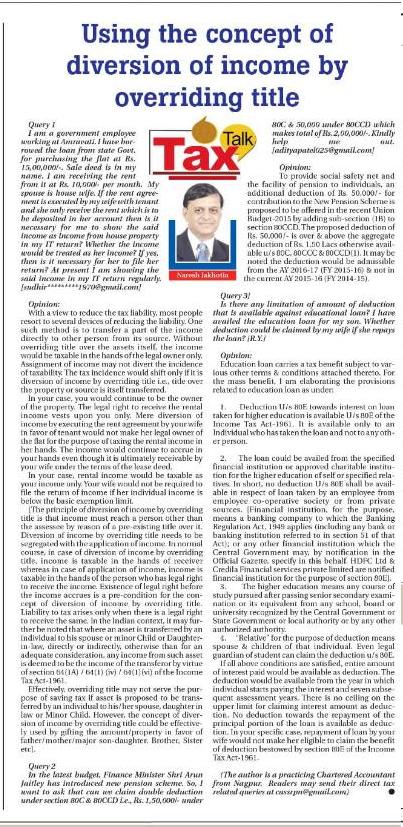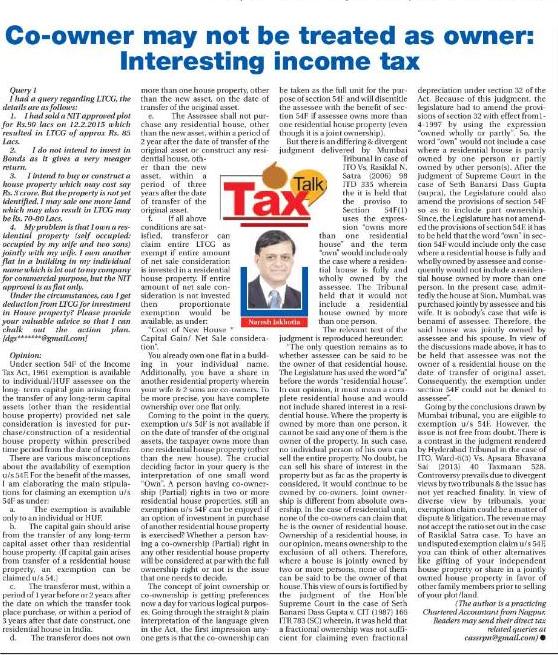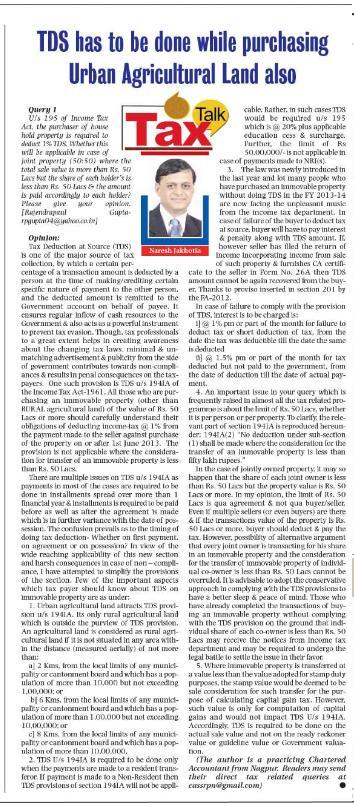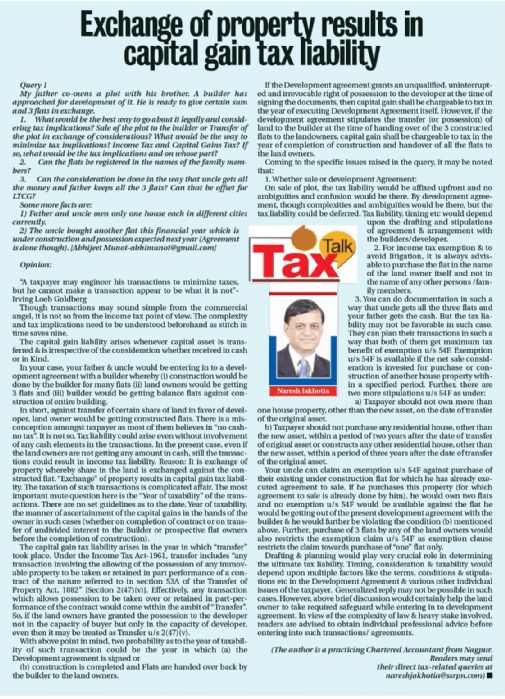Article Details
| Income Tax may be payable even if there is no actual income |
|
TAX TALK-14.12.2015-THE HITAVADA TAX TALK CA. NARESH JAKHOTIA Chartered AccountantIncome Tax may be payable even if there is no actual income Query 4] In the current year, I am purchasing one three storied Building – 22 years old for a price of Rs. 51 Lacs and paid advance of Rs. 5 Lacs also in the last month. The stamp duty valuation of the property is Rs. 54 Lacs. I am told that I would be liable to pay income tax on difference of Rs. 3 Lacs? Is it true? Is it logical? Any remedy or way out or option to avoid it? [rao2319k@gmail.com] Opinion: There is no such thing as a good tax- Winston Churchill. In normal course, income-tax is payable on real income only. However, there are several instances under the Income Tax Act that belie any logic and tax liability arises even without real income also. One such instance is with regard to purchase of the property below the stamp duty or ready reckoner valuation. Now, paying stamp duty on a higher valuation than the actual sale price has adverse tax impact in the hands of purchaser also. By the Finance Act-2013, Section 56(2) has been amended so as to provide that if any individual or HUF purchases any immoveable property for an inadequate consideration (i.e., if the stamp duty valuation of the property is more than the actual purchase price) and the difference between stamp duty valuation and actual purchase price is more than Rs.50,000/-, then such difference shall be taxable in the hands of the individual or HUF as “Income from Other Source”. For this purpose, stamp duty valuation as on the date of agreement to sale could be considered if any part of the consideration is paid by the purchaser otherwise than in cash. Taxpayers may now rightly conclude that purchasing the property below the stamp duty value is taxing now. Income tax is not always on actual income. Even purchasing property below stamp duty valuation could result in additional tax liability. In your specific case, you are purchasing the property for Rs. 51 Lacs, the stamp duty valuation of which is Rs. 54 Lacs. You would be liable to incorporate Rs. 3 Lacs as your income in the income tax return. It may sound illogical. Even though there is no actual income of Rs. 3 Lacs at the time of purchasing the property, still you would be liable to pay the tax by treating Rs. 3 Lacs as your income. The basis of the Income Tax should be to tax the real income of a person, so that the person is induced to remain honest. However, the fact remains- There is no such thing as a good tax. A word of caution: Rs. 54 Lacs is the present stamp duty valuation of the property. If you have paid Rs. 5 Lacs by cheque, the stamp duty valuation of subsequent date when the sale deed would be executed will not be relevant. Else, the stamp duty valuation of the date of sale deed would be relevant and not present stamp duty valuation of Rs. 54 Lacs [In Maharashtra, change in ready reckoner value is effected from 1st January every year. If any taxpayer has finalized any property then ensure to make the payment by “cheque” so that the stamp duty valuation of the current year itself could be considered and subsequent year higher valuation may not impose additional unwanted tax burden on them]. Query 2] We have query with regard to tax benefit on housing loan. In case, we have one house property on which we have availed income tax rebate in respect of interest & loan amount, if we further take loan on same property for modification of house/ flat, whether we will get rebate in income tax on additional loan interest? [Hemant Kumar Kankane - hemneel.kankane@rediffmail.com] Opinion: Though Interest on housing loan availed for purchase or construction of house property is eligible for deduction u/s 24(b) up to a maximum of Rs. 2 Lacs, it is not so with respect to loan taken for repairs, renovation, and alteration in the house property. In respect of such loan, (a) Interest would be eligible for deduction up to a maximum of Rs. 30,000/- (& not Rs. 2 Lacs). (b) Repayment of principal portion of loan is also not eligible for deduction u/s 80C. Query 3] What is the tax liability of the person, as next of kin, receiving by nomination some amount contributed by the colleagues of a deceased person after death? It is not insurance money but a schematic help provided by a group of people for their fraternity. [Dr Subhash Tiwari, Akola- drsrtiwari@gmail.com] Opinion: Any sum of money received by any individual from any person or persons without consideration shall be taxable in the hands of recipient if the aggregate of such amount exceeds Rs. 50,000/-. An exception is provided if the amount is received in the following cases:
In your specific case, the recipient would not be receiving the amount “under a will or by way of inheritance” but ultimately by way of contribution by the colleagues of the deceased person for the welfare of his/her family members. Though, the purpose is noble, income tax is still leviable from the recipients. Further, even if the amount contributed by any single person may be less than Rs. 50,000/-, if the total amount from all the donors taken together received exceeds Rs. 50,000/-, it would be taxable. However, recipient would be eligible for the basic exemption limit. Query 4] I received IT paper notice in the name of my mother about four months ago for non filing of ITR form for the FY-2012-13.My mother expired in November’2014 at the age of 85. As her basic income was below the Exemption limit, it was replied accordingly stating about her Death with 'Death certificate' attached under my signature as her son. The compliance was given online & by Letter also as desired by ITO, Nagpur. Now recently, I again received notice by E-Mail in my mother's name for non filing of ITR for the FY-2013-14 during which time also, her income was below the Exemption limit. My query: Is it necessary to reply second notice when my mother is not alive and income not taxable? Please advice suitably in the matter. [vdpankey@rediffmail.com]Opinion:It is always advisable to respond to the notice received from the Income Tax Department. Non-responding or not complying with the notices would not end up the proceeding. An Online monitoring system of the Income tax department ensures further follow-up till the issue is resolved satisfactorily. The best remedy is to reply the notice timely so that further notices or alternative action is avoided. [The author is a practicing Chartered Accountant from Nagpur. Readers may send their direct tax related queries at SSRPN & Co 10, Laxmi Vyankatesh Apartment C.A. Road, Telephone Exch. Square Nagpur-440008 or email it at nareshjakhotia@ssrpn.com] |
 |




.png)




